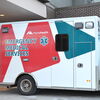Processing Your Payment
Please do not leave this page until complete. This can take a few moments.
UNE program tackles growing need for skilled health IT specialists
 Photo / Tim Greenway
Left to right, Megan Landry, UNE health informatics program manager; Martha Wilson, dean of the UNE College of Graduate and Professional Studies; Jay Collier, director of computational and digital programs; and Ellen Beaulieu, vice president for strategic initiatives, in the UNE online marketing office at the UNE Portland campus.
Photo / Tim Greenway
Left to right, Megan Landry, UNE health informatics program manager; Martha Wilson, dean of the UNE College of Graduate and Professional Studies; Jay Collier, director of computational and digital programs; and Ellen Beaulieu, vice president for strategic initiatives, in the UNE online marketing office at the UNE Portland campus.
Vandna Bhambri has never set foot on the University of New England's campuses in Portland and Biddeford, but she learned enough from the university's digital profile to decide she would enroll in its new online graduate program in health informatics.
“I'd been looking at other programs,” says Bhambri, who earned her bachelor's degree in biology at the University of Illinois and has been working for almost a decade in the managed-care field of health care. “I found UNE's program to be more affordable in terms of cost. That's a plus. I also knew they have a great reputation … They've been ranked by U.S. News & World Report for their graduate programs in medicine and health sciences and by Forbes as a 'top college' with a good return on investment. They're also accredited.”
Bhambri's own profile — she's a working professional in metropolitan Boston who's seeking to expand her information technology skills in order to advance her career goal of being more involved in shaping health care policy — is exactly the kind of student UNE hoped to attract in launching its online graduate degree program in one of the fastest-growing fields in health care.
Supported by a grant from the Bill and Melinda Gates Foundation, the new health informatics program, which launched in January, is UNE's first “competency-based” degree offering. It's part of an emerging trend in higher education that recognizes there are millions of working adults who need to complete their first degree, earn a second or simply update their skills but can't afford to put their lives on hold to do so. UNE's online health informatics graduate program allows students to work at their own pace, completing course work in an online curriculum developed with input from key stakeholders in Maine's health care industry. UNE President Danielle Ripich considers it an essential step in the university's ongoing effort to meet the needs of both students seeking meaningful careers and Maine businesses that are clamoring for skilled workers.
“We need to continue to look for ways to provide access, to keep costs for students contained and to creatively educate the next generation,” she says in a commentary about the new program published in the most recent newsletter of the Association of Schools of Allied Health Professions. “It is an exciting time for higher education, and we can be leaders in many ways as we use our strengths to keep our programs engaged in these challenges and opportunities.”
Addressing a need
John Spritz, manager of Growing Portland, a collaboration between the city of Portland and the Portland Regional Chamber of Commerce, says UNE's new program advances the collaborative's initiative of “building a center of excellence in health care informatics” that was launched in late 2013.
“It's great what UNE is doing,” he says. “The hope is that it will be the start of something big.”
“The Health Informatics Assessment Project,” an April 2015 report prepared for Growing Portland with funding support from Maine Technology Institute, provides both local and national evidence that health informatics — defined by Loma Linda University as “a discipline at the intersection of information science, computer science and health care” — is a rapidly growing job market. The growth is driven by the Affordable Care Act's push for greater use of electronic health records; increasingly sophisticated computer technology being used by hospitals, doctors, insurers and patients; and the continuing challenge of reducing the overall cost of health care.
Among the report's findings:
- Employment for health information technicians is projected to grow 22% in the next six years, according to the U.S. Bureau of Labor Statistics.
- “The health care analytics market has exploded,” according to a 2013 Chilmark Research trends report. “Health care organizations of all sizes are now seeking solutions that will help them better understand the population that they will be responsible for, and the incumbent risk … as reimbursement models shift. This has created a hyper-driven market.”
- Approximately 3,000 Mainers are employed in some form of health informatics occupation, with 2,000 to 2,500 located in Greater Portland.
- Half of the stakeholders responding to Growing Portland's survey reported that health informatics staffers made under $75,000, while the other half reported salaries ranging between $75,000 and $150,000.
- The primary way of finding talent? “Another organization within Maine,” was the most common response.
- “There is not (yet) a reliable higher education pipeline for health informatics talent within the state of Maine. But the need is there.”
Stakeholders play a role
Martha Wilson, dean of graduate and professional studies and the associate provost for online learning at UNE, says the university currently has about 1,300 students taking fully online programs. About 18 months ago, UNE received a Gates Foundation grant to create a competency-based degree that would be based on students showing a consistent application of knowledge and skills tied to standards of performance required in the workplace.
Aware of the research done by Growing Portland, UNE decided to use the grant to craft a three-pronged approach to capitalize on the opportunities its report highlighted in health informatics. The first two prongs target older, working adults who would take online courses in either a two-year-and-a-semester master's program or a certificate program requiring completion of the first six courses in the master's degree. The third prong involves creating a four-year undergraduate degree program that will be launched next fall.
“We did a lot of work with the stakeholders,” Wilson says. “We brought together a group of individuals and came away from those conversations with the realization that there was a pressing need for health informatics. We had a really nice synergy with employers who were willing to sit at the table and tell us what kinds of things they need to have. It was a hand-in-glove fit for us. It brought together high-level individuals from these institutions, resulting in buy-in from the top.”
Holly Parker, coordinator of academic innovations and a facilitator of networking between faculty and employers, says six stakeholders helped UNE develop the curriculum for the new health informatics degree programs: Athenahealth, InterMed, Dartmouth Medical School, MaineGeneral Health Services, Harvard Pilgrim Health Care, Winxnet.
That planning process was unique in how closely the college worked with health industry stakeholders to shape a curriculum that had both academic rigor and would give students the essential skills that those stakeholders needed in health informatics employees, adds Ellen Beaulieu, UNE's vice president for strategic initiatives.
“This was very refreshing to them,” she says. “They got us thinking about the idea of essential workforce competencies, such as good communication skills.”
Parker says UNE currently has 18 students signed up for the pilot bachelor's degree program, eight students in the master's program and two students in the certificate program. All eight of the first master's degree enrollees are adults, ages 30 to 50, who already work in health care. Several are nurses, one is an occupational therapist, another a health promotion coach and one an insurance claims adjuster.
“We expect those numbers to grow, based on the marketing test we did,” she says. “Within the next three years, it's a safe bet there will be more than 100 students enrolled in the program.”
Jay Collier, previously the program director of Project>Login, a workforce development initiative of Educate Maine for the computing and information technology fields, recently was hired to coordinate UNE's computational and digital programs. He sees the competency-based approach of the new health informatics programs as one that could easily apply to other disciplines as well.
“The core of this new degree program is making sure we are teaching our students to make decisions that are grounded in critical thinking,” he says. “The core competencies at the heart of the health informatics field are the same skills required by other industries as well.”
Megan Landry, manager of the health informatics program, who brings to that role more than 12 years of experience as an emergency department nurse, agrees.
“Health care is changing so rapidly,” she says. “It's a challenge to be constantly keeping up-to-date and being able to see the big picture is absolutely something to strive for.”
For master's degree candidate Vandna Bhambri, the new program seems tailor-made to her goal of becoming more involved in health care policy-making, which she could see in her current job is increasingly reliant on information technology. She wants to make sure the human side of health care doesn't get overlooked in that trend.
“I really like to help people,” she says. “Making health care affordable is one way of doing that. For a lot of people, that's what it comes down to.”
Read more













Comments